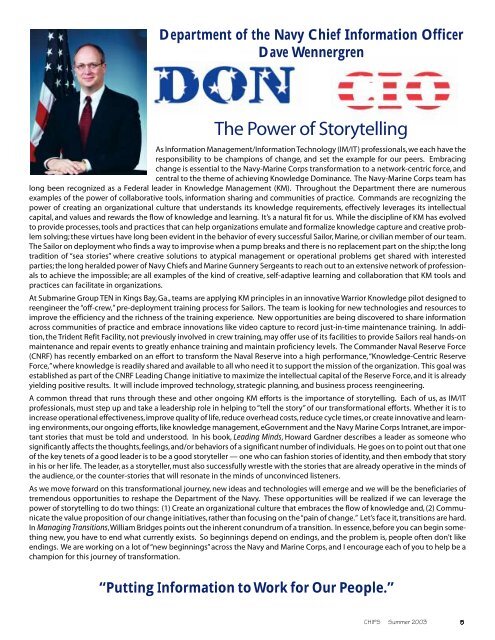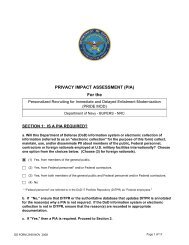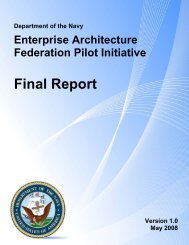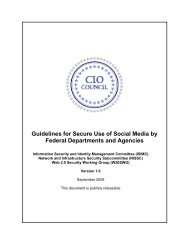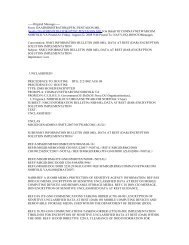Download PDF - Department of Navy Chief Information Officer - U.S. ...
Download PDF - Department of Navy Chief Information Officer - U.S. ...
Download PDF - Department of Navy Chief Information Officer - U.S. ...
Create successful ePaper yourself
Turn your PDF publications into a flip-book with our unique Google optimized e-Paper software.
<strong>Department</strong> <strong>of</strong> the <strong>Navy</strong> <strong>Chief</strong> <strong>Information</strong> <strong>Officer</strong><br />
Dave Wennergren<br />
The Power <strong>of</strong> Storytelling<br />
As <strong>Information</strong> Management/<strong>Information</strong> Technology (IM/IT) pr<strong>of</strong>essionals,we each have the<br />
responsibility to be champions <strong>of</strong> change, and set the example for our peers. Embracing<br />
change is essential to the <strong>Navy</strong>-Marine Corps transformation to a network-centric force, and<br />
central to the theme <strong>of</strong> achieving Knowledge Dominance. The <strong>Navy</strong>-Marine Corps team has<br />
long been recognized as a Federal leader in Knowledge Management (KM). Throughout the <strong>Department</strong> there are numerous<br />
examples <strong>of</strong> the power <strong>of</strong> collaborative tools, information sharing and communities <strong>of</strong> practice. Commands are recognizing the<br />
power <strong>of</strong> creating an organizational culture that understands its knowledge requirements, effectively leverages its intellectual<br />
capital, and values and rewards the flow <strong>of</strong> knowledge and learning. It’s a natural fit for us. While the discipline <strong>of</strong> KM has evolved<br />
to provide processes, tools and practices that can help organizations emulate and formalize knowledge capture and creative problem<br />
solving; these virtues have long been evident in the behavior <strong>of</strong> every successful Sailor, Marine, or civilian member <strong>of</strong> our team.<br />
The Sailor on deployment who finds a way to improvise when a pump breaks and there is no replacement part on the ship; the long<br />
tradition <strong>of</strong> “sea stories” where creative solutions to atypical management or operational problems get shared with interested<br />
parties; the long heralded power <strong>of</strong> <strong>Navy</strong> <strong>Chief</strong>s and Marine Gunnery Sergeants to reach out to an extensive network <strong>of</strong> pr<strong>of</strong>essionals<br />
to achieve the impossible; are all examples <strong>of</strong> the kind <strong>of</strong> creative, self-adaptive learning and collaboration that KM tools and<br />
practices can facilitate in organizations.<br />
At Submarine Group TEN in Kings Bay, Ga., teams are applying KM principles in an innovative Warrior Knowledge pilot designed to<br />
reengineer the “<strong>of</strong>f-crew,” pre-deployment training process for Sailors. The team is looking for new technologies and resources to<br />
improve the efficiency and the richness <strong>of</strong> the training experience. New opportunities are being discovered to share information<br />
across communities <strong>of</strong> practice and embrace innovations like video capture to record just-in-time maintenance training. In addition,<br />
the Trident Refit Facility, not previously involved in crew training, may <strong>of</strong>fer use <strong>of</strong> its facilities to provide Sailors real hands-on<br />
maintenance and repair events to greatly enhance training and maintain pr<strong>of</strong>iciency levels. The Commander Naval Reserve Force<br />
(CNRF) has recently embarked on an effort to transform the Naval Reserve into a high performance,“Knowledge-Centric Reserve<br />
Force,”where knowledge is readily shared and available to all who need it to support the mission <strong>of</strong> the organization. This goal was<br />
established as part <strong>of</strong> the CNRF Leading Change initiative to maximize the intellectual capital <strong>of</strong> the Reserve Force, and it is already<br />
yielding positive results. It will include improved technology, strategic planning, and business process reengineering.<br />
A common thread that runs through these and other ongoing KM efforts is the importance <strong>of</strong> storytelling. Each <strong>of</strong> us, as IM/IT<br />
pr<strong>of</strong>essionals, must step up and take a leadership role in helping to “tell the story” <strong>of</strong> our transformational efforts. Whether it is to<br />
increase operational effectiveness,improve quality <strong>of</strong> life,reduce overhead costs,reduce cycle times,or create innovative and learning<br />
environments, our ongoing efforts,like knowledge management,eGovernment and the <strong>Navy</strong> Marine Corps Intranet, are important<br />
stories that must be told and understood. In his book, Leading Minds, Howard Gardner describes a leader as someone who<br />
significantly affects the thoughts, feelings,and/or behaviors <strong>of</strong> a significant number <strong>of</strong> individuals. He goes on to point out that one<br />
<strong>of</strong> the key tenets <strong>of</strong> a good leader is to be a good storyteller — one who can fashion stories <strong>of</strong> identity, and then embody that story<br />
in his or her life. The leader, as a storyteller, must also successfully wrestle with the stories that are already operative in the minds <strong>of</strong><br />
the audience, or the counter-stories that will resonate in the minds <strong>of</strong> unconvinced listeners.<br />
As we move forward on this transformational journey, new ideas and technologies will emerge and we will be the beneficiaries <strong>of</strong><br />
tremendous opportunities to reshape the <strong>Department</strong> <strong>of</strong> the <strong>Navy</strong>. These opportunities will be realized if we can leverage the<br />
power <strong>of</strong> storytelling to do two things: (1) Create an organizational culture that embraces the flow <strong>of</strong> knowledge and, (2) Communicate<br />
the value proposition <strong>of</strong> our change initiatives, rather than focusing on the“pain <strong>of</strong> change.” Let’s face it, transitions are hard.<br />
In Managing Transitions,William Bridges points out the inherent conundrum <strong>of</strong> a transition. In essence, before you can begin something<br />
new, you have to end what currently exists. So beginnings depend on endings, and the problem is, people <strong>of</strong>ten don’t like<br />
endings. We are working on a lot <strong>of</strong> “new beginnings” across the <strong>Navy</strong> and Marine Corps, and I encourage each <strong>of</strong> you to help be a<br />
champion for this journey <strong>of</strong> transformation.<br />
“Putting <strong>Information</strong> to Work for Our People.”<br />
CHIPS Summer 2003 5


